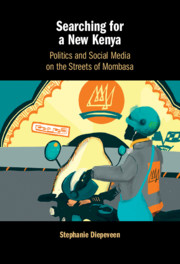7 results
Going Digital … But What For? Parties' Ideological Positions and Divides on Platform Societies in Western Europe
-
- Journal:
- Government and Opposition , First View
- Published online by Cambridge University Press:
- 18 October 2024, pp. 1-26
-
- Article
-
- You have access
- Open access
- HTML
- Export citation
3 - The Sound of Our Own Voice
-
- Book:
- A Web of Our Own Making
- Published online:
- 04 May 2023
- Print publication:
- 11 May 2023, pp 88-161
-
- Chapter
- Export citation

A Web of Our Own Making
- The Nature of Digital Formation
-
- Published online:
- 04 May 2023
- Print publication:
- 11 May 2023
9 - In the Presence of Fear
- from Part IV - The Power of Publics
-
- Book:
- Searching for a New Kenya
- Published online:
- 18 May 2021
- Print publication:
- 06 May 2021, pp 183-195
-
- Chapter
- Export citation
10 - The Individual Spectator and the Role of Imagination in Publics
- from Part IV - The Power of Publics
-
- Book:
- Searching for a New Kenya
- Published online:
- 18 May 2021
- Print publication:
- 06 May 2021, pp 196-218
-
- Chapter
- Export citation

Searching for a New Kenya
- Politics and Social Media on the Streets of Mombasa
-
- Published online:
- 18 May 2021
- Print publication:
- 06 May 2021
The Consequences of Some Angry Re-Tweets: Another Medium is the Message
-
- Journal:
- Review of Middle East Studies / Volume 53 / Issue 2 / December 2019
- Published online by Cambridge University Press:
- 28 November 2019, pp. 259-293
- Print publication:
- December 2019
-
- Article
- Export citation

